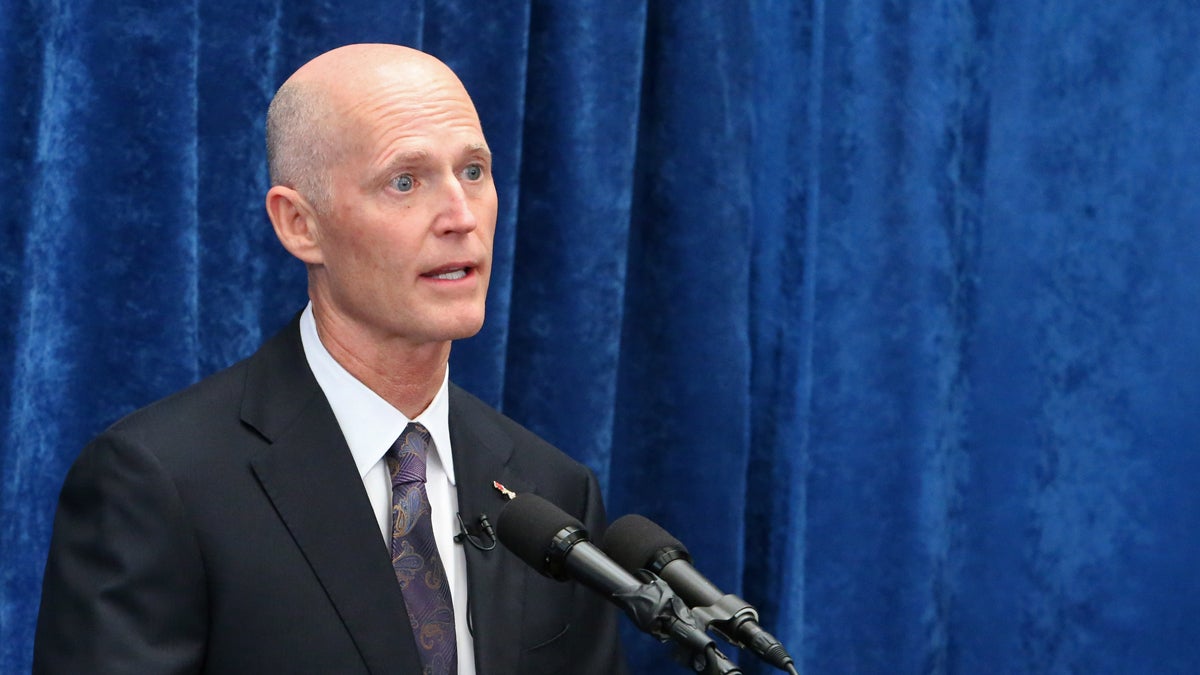Pennsylvania’s business climate: The good, the bad, the strange
Listen
Florida Gov. Rick Scott (AP Photo/Steve Cannon)
Companies evaluate where to set up shop by looking at labor, logistics, taxes and government incentives. So how does Pennsylvania fare?
Florida Governor Rick Scott came to Philadelphia this week to meet with company heads, to try to lure business to the Sunshine State. Scott campaigned on the promise of growing private sector jobs in Florida and one of his tactics has been to visit other states – including California, Illinois, and Maryland – to recruit job creators.
Former Pennsylvania Gov. Ed Rendell said it’s a bit unusual for a governor to show up like Scott did in Philadelphia “but it is not unusual at all for that state government to make calls into other businesses to urge them to relocate into their state. I did it very very often when I was governor.” States, and even municipalities, are competing for companies everyday.
But a call from a governor is rarely enough. In fact, there’s a whole industry around helping companies decide where to locate. Siting consultants evaluate factors like labor, logistics, taxes and government incentives. So how does Pennsylvania fare?
Labor
Brian Corde, a managing partner with Atlas Insight, a siting company based in New Jersey, said Pennsylvania is a well-educated state. “There’s no doubt about that,” he said. “[It’s] got some really top-notch universities.”
Pennsylvania has an above average college degree attainment rate at 44 percent. In Florida it’s 36 percent.
Steve Weitzner, with Silverlode, a Cleveland-based siting company, says productivity per worker also tends to be higher in Pennsylvania than in Florida. “That may vary by industry but in the industries that we’ve analyzed Pennsylvania comes out 15 percent more productive per worker than Florida does,” he said.
On the other hand, labor costs in Pennsylvania tend to be higher than in Florida. Weitzner said that’s at least in part to make up for the fact that Pennsylvania has a personal income tax and Florida does not.
Taxes
Florida’s low tax rates have been Scott’s biggest selling point during his visit. “American companies are not going to succeed with higher taxes, they’re not going to succeed with more regulation,” he said in Philadelphia Monday.
Nate Benefield, Vice President of Policy Analysis with the right-leaning Commonwealth Foundation, agreed with that sentiment. Pennsylvania’s corporate income tax rate is 9.9 percent, while Florida’s is 5.5 percent. He said “Pennsylvania’s business climate certainly ranks towards the bottom” and “the biggest thing we recommend is lowering our corporate tax rate.”
But Pennsylvania calculates what’s due by looking only at sales, while Florida looks at sales, payroll, and property in the state. That’s a structure that could benefit companies. The different formulas mean that depending on a company’s business model it could end up paying more in Florida, despite the state’s lower tax rate. Both states also have exceptions that reduce business taxes; many do not pay the full amount.
Incentives
Weitzner said government incentives, like tax breaks, are rarely a top priority for companies in their location scouting process. Incentives are temporary, and, Weitzner said, usually nominal for larger companies. But they can make a difference once the decision maker has narrowed it down to a short list. “If you think about CEOs, CFOs, these tend to be competitive people that like to win at things, so if they can secure what appears to be a large state or local incentive package, that’s a big boost sort of from an ego perspective,” he said.
By a couple of different measures Pennsylvania is slightly more generous with them than Florida. [Whether tax incentives are a good investment is a topic of debate, however.]
Logistics
Philadelphia is close to the Northeast, Pittsburgh abuts the Midwest markets, and roads and rails connect everything. That’s the good news. Herzenberg, of the Keystone Research Center, said it’s good for supplies and for reaching customers.
“We’re…within a day’s drive of half the U.S.’ population, and well within a day’s drive of the manufacturing base,” Herzenberg said.
The quality of the links, though, is another question. Both states get a C- on the American Society of Civil Engineers’ infrastructure report card, but Pennsylvania has thousands more structurally deficient bridges and a higher percentage of roads in poor condition. That’s a cost for businesses. Pennsylvania did recently pass a transportation bill that’s pumping new funds into infrastructure.
There are other factors, as well. Quality of life is increasingly a major consideration for companies, so Scott repeatedly plugged Florida’s warmer temperatures during his frigid Philadelphia visit. Things like real estate cost, utility cost, and airport access can all play a role.
All these factors will mean different things for different projects, but overall, site consultants say Pennsylvania does pretty well. Still, Herzenberg said Scott’s visit can serve as a teaching moment.
“Let’s welcome it, right?” he said.
WHYY is your source for fact-based, in-depth journalism and information. As a nonprofit organization, we rely on financial support from readers like you. Please give today.


